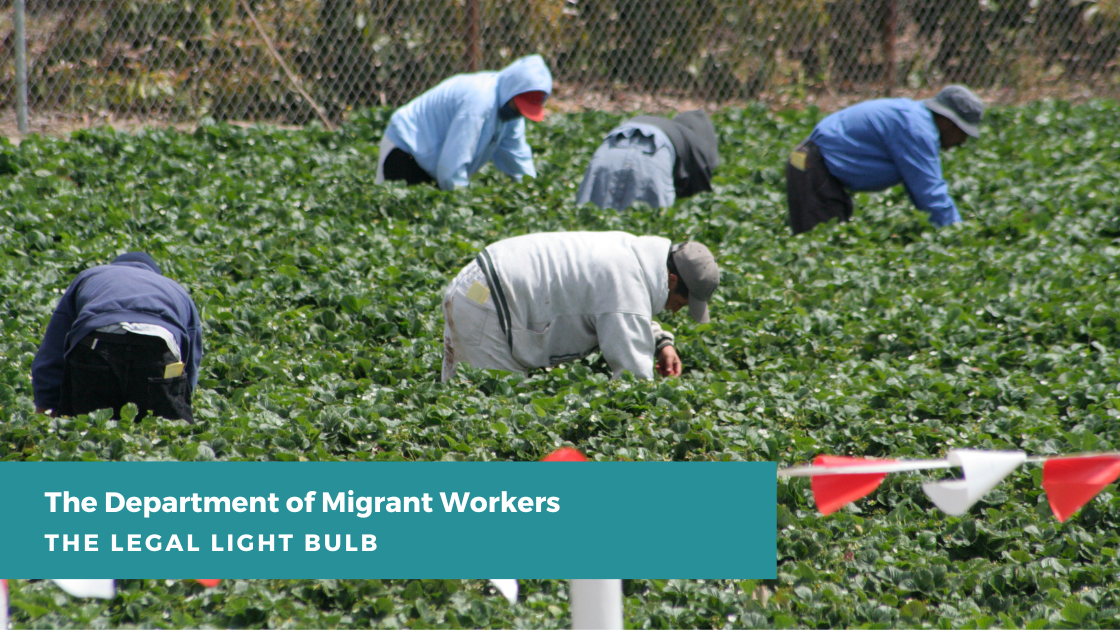Throughout the ups and downs of the Philippine economy, our countrymen are able to persevere and adapt to troubles brought by the country’s unstable economy. Filipinos continue to traverse all around the globe to seek greener pastures to provide a better life for their families. Overseas Filipino Workers (“OFWs”) are hailed to be the Philippines’ “Bagong Bayani” (modern-day heroes) owed to their significant contribution to keeping the Philippine economy afloat because of their remittances from different countries. Not lagging behind, the Philippine government in turn had established a new law to ease further and strengthen the impact on Migrant Workers.
On 30 December 2021, former President Rodrigo Roa Duterte signed into law Republic Act No. 11641 known as the “Department of Migrant Workers Act”. The new law seeks to:[1]
Protect the rights and promote the welfare of Overseas Filipino Workers and their families by:
(a) ensuring that private recruitment shall meet professional, legal, and ethical standards;
(b) obtaining the best possible conditions of work that uphold the dignity of Overseas Filipino Workers;
(c) providing timely and responsive services to address their needs regardless of legal status;
(d) ensuring their participation in the formulation of policies affecting their welfare; and
(e) providing mechanisms for skills development and reintegration.”
To effectively carry out the purposes of the law, the State consolidated the Philippine Overseas Employment Administration (“POEA”) and all other agencies handling OFWs’ concerns enumerated in Section 19 of the law, into one (1) agency called the Department of Migrant Workers (“the Department”).[2] The Department absorbed all the powers, functions, and mandates of the POEA and the enumerated agencies in Section 19.[3]
Some of the important and innovative functions and powers of the department are as follows:
- Formulate, recommend, and implement national policies, plans, programs, and guidelines that will ensure the protection of OFWs, including their safe, orderly, and regular migration, the promotion of their interests, the timely and effective resolution of their problems and concerns, and their effective reintegration into the Philippine society.[4]
- Regulate the recruitment, employment, and deployment of OFWs abroad to protect the interests and well-being of these workers.[5]
- Protect and promote the welfare, well-being, and interests of the families of OFWs in accordance with this Act, consistent with the constitutional policy of upholding the sanctity of the family as a basic autonomous social institution and valuing the vital role of youth in nation-building.[6]
- Support and assist the Department of Foreign Affairs (“DFA”) and relevant government agencies in building solid and harmonious partnerships with counterpart and relevant agencies in foreign countries in order to facilitate the implementation of strategies and programs for the protection and promotion of the rights and well -being of OFWs and their families, and to continuously monitor economic, political, and labor developments therein.[7]
- Establish a 24/7 Emergency Response and Action Center Unit and media and social media monitoring center to respond to the emergency needs of OFWs and their families.[8]
- Perform all the powers, functions, and responsibilities assigned to all agencies, offices, or units to be transferred to, or absorbed by, the Department pursuant to the consolidation mandated by this Act.[9]
The law assures the transparency of the contract of migrant workers from the start of the recruitment process up to the deployment abroad so that their rights will be protected. In order to avoid lengthy applications and to strengthen the protection of OFWs, the law has merged different departments and agencies handling OFWs’ concerns into one Department. Moreover, the law provided reintegration programs, livelihood programs, wellness programs, financial programs, and other similar projects for returning migrant workers into the Philippine society.





